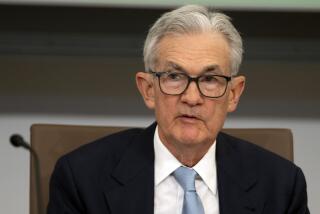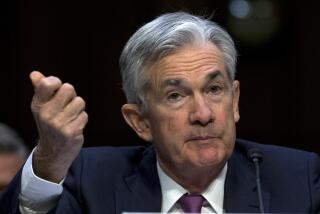Bernanke sees little effect on U.S. from pricey oil
- Share via
Reporting from Washington — Federal Reserve Chairman Ben S. Bernanke said a sustained rise in prices for oil and other commodities would threaten the economic recovery, but that even with the turmoil in the Middle East he did not expect higher prices would create inflation problems in the United States.
“The most likely outcome is that the recent rise in commodity prices will lead to, at most, a temporary and relatively modest increase in U.S. consumer price inflation,” Bernanke said in testimony Tuesday before the Senate Banking Committee.
That projection is consistent with the views of other members of the Federal Reserve Open Market Committee, which sets monetary policy, and most private forecasters, he said.
Still, Bernanke said, rising gas prices are “something we have to pay very close attention to.”
“I think we’ve learned that there is no way to have sustained economic growth with high and variable inflation,” he said. “So keeping inflation low and stable …is absolutely essential and we are committed to doing that.”
But while the recent increase is clearly a problem for many people, gas prices “do not yet pose a significant risk” to the recovery or inflation, Bernanke said.
Bernanke’s semiannual report to Congress this week — he will appear before a House committee Wednesday — comes as some lawmakers, particularly Republicans, have raised strong concerns about inflation.
Fed critics have said its ongoing plan to further stimulate the economy by purchasing up to $600 billion in Treasury bonds is fueling inflation by flooding the market with cheap money.
Sen. Richard C. Shelby (R-Ala.) warned of the implications if inflation gained too much momentum.
“Once price stability has been lost, as you well know, it is difficult and very costly to regain,” Shelby said. He recalled the battle led by former Fed Chairman Paul Volcker in the early 1980s to deal with runaway inflation, which led to mortgage rates of about 18% and helped spark a deep recession.
Bernanke acknowledged the concerns about inflation, fueled recently by rising oil prices because of unrest in the Middle East.
“Although overall inflation is low, since summer we have seen significant increases in some highly visible prices, including those of gasoline and other commodities,” he said. “Notably, in the past few weeks, concerns about unrest in the Middle East and North Africa and the possible effects on global oil supplies have led oil and gasoline prices to rise further.”
But Bernanke said the effect on U.S. consumer prices of such rises in commodities “has been quite low in recent decades.”
Evidence so far was that the Fed’s bond-buying program was having “a beneficial effect” on the economy, he said, but he and his colleagues would continue to review the program and make changes as necessary.
Bernanke said it was important for Congress and the White House to address the long-term budget deficit, but not at the expense of damaging the fragile recovery as it appears to be gaining momentum.
He reiterated the Fed’s most recent projection that total economic output, or gross domestic product, would increase between 3.5% and 4% this year.
A Republican proposal to cut about $60 billion from this year’s budget wouldn’t derail the recovery, Bernanke said, but would reduce annual economic output by “several tenths” of a percentage point.
He disagreed with a recent Goldman Sachs Group Inc. report predicting that GOP cuts could reduce economic growth this year by as much as 2 percentage points.
More to Read
Inside the business of entertainment
The Wide Shot brings you news, analysis and insights on everything from streaming wars to production — and what it all means for the future.
You may occasionally receive promotional content from the Los Angeles Times.











